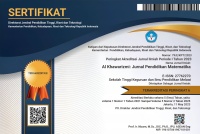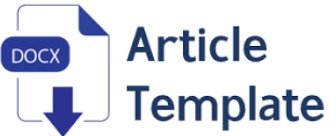Pengaruh Metode Pembelajaran Hybrid Terhadap Self-Efficacy Siswa Dalam Pembelajaran Matematika
DOI:
https://doi.org/10.46368/kjpm.v4i1.2313Abstract
Penelitian ini bertujuan untuk meneliti pengaruh metode pembelajaran hybrid terhadap self-efficacy siswa dalam pembelajaran matematika di Indonesia. Metode pembelajaran hybrid menggabungkan pembelajaran tatap muka dengan pembelajaran online, yang memungkinkan siswa untuk berinteraksi langsung dengan guru dan teman sebaya serta belajar secara mandiri sesuai dengan kecepatan mereka sendiri. Penelitian ini menggunakan desain kuasi-eksperimen dengan pretest-posttest control group design. Partisipan penelitian ini dibagi menjadi dua kelompok: kelompok eksperimen yang mengikuti metode pembelajaran hybrid dan kelompok kontrol yang mengikuti metode pembelajaran konvensional.
Hasil penelitian menunjukkan bahwa metode pembelajaran hybrid memiliki pengaruh positif yang signifikan terhadap self-efficacy siswa dalam matematika. Rata-rata skor self-efficacy siswa pada kelompok eksperimen meningkat dari 3.2 menjadi 4.0, sementara pada kelompok kontrol hanya meningkat dari 3.1 menjadi 3.2. Analisis paired samples test menunjukkan perbedaan yang signifikan antara kedua kelompok (p < 0.05). Selain itu, prestasi matematika siswa pada kelompok eksperimen juga meningkat lebih signifikan dibandingkan dengan kelompok kontrol. Temuan ini mendukung penerapan metode pembelajaran hybrid sebagai strategi efektif untuk meningkatkan self-efficacy dan prestasi siswa dalam matematika.
References
Bandura, A. (1986). Social Foundations of Thought and Action: A Social Cognitive Theory. Englewood Cliffs, NJ: Prentice-Hall.
Cheng, J., & Wang, S. (2015). Hybrid Learning: The New Normal in Higher Education. Journal of Educational Technology, 12(4), 45-56.
Morris, J., Stommel, C., & Fritz, A. (2015). Hybrid Teaching and Learning: Exploring the Impacts on Student Achievement and Engagement. International Journal of Instructional Media, 42(3), 241-254.
Xue, H., Li, Z., & Chen, P. (2014). Enhancing Student Learning Outcomes with Hybrid Instruction: An Empirical Study. Educational Technology & Society, 17(2), 47-58.
Al-Shebli, M., & Ali, A. (2015). The Impact of Hybrid Learning on Student Self-Efficacy and Achievement. Journal of E-Learning and Knowledge Society, 11(3), 75-85.
Johnson, R., Hornik, S., & Salas, E. (2013). An Empirical Examination of Factors Contributing to the Success of Hybrid Learning in Higher Education. Computers & Education, 62, 20-29.
Li, N., & Chu, S. (2015). Applying Hybrid Learning Models to Improve Student Self-Efficacy in Mathematics. Journal of Educational Research and Practice, 5(1), 23-39.
Downloads
Published
How to Cite
Issue
Section
Citation Check
License
Authors who publish with this journal agree to the following terms:
1. Authors retain copyright and grant the journal right of first publication with the work simultaneously licensed under a Creative Commons Attribution License that allows others to share the work with an acknowledgement of the work's authorship and initial publication in this journal.
2. Authors are able to enter into separate, additional contractual arrangements for the non-exclusive distribution of the journal's published version of the work (e.g., post it to an institutional repository or publish it in a book), with an acknowledgement of its initial publication in this journal.
3. Authors are permitted and encouraged to post their work online (e.g., in institutional repositories or on their website) prior to and during the submission process, as it can lead to productive exchanges, as well as earlier and greater citation of published work.






